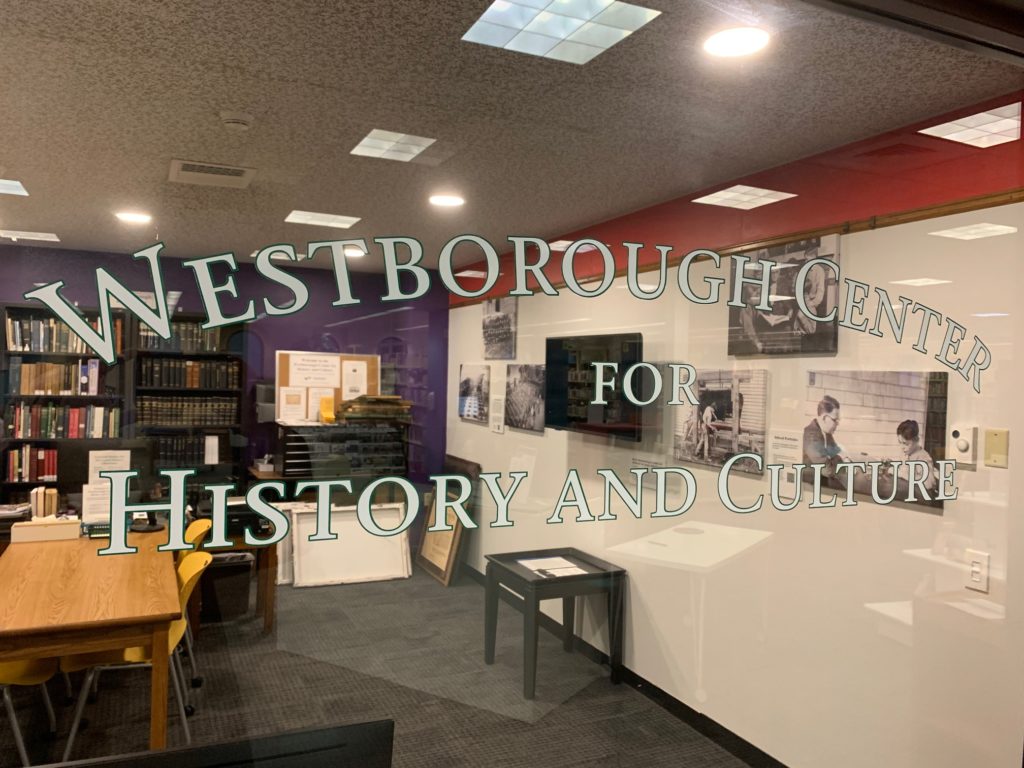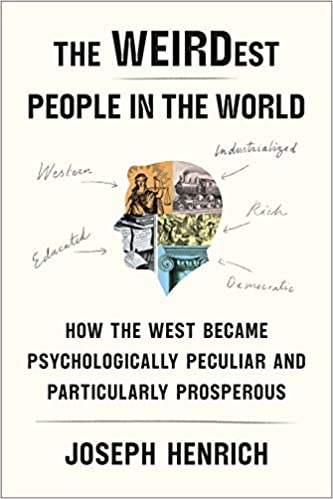What’s In a Name?
When I got the chance to rebrand the Westborough Room several years ago, I wanted to find a name that better captured my vision for how Westborough’s rich historical resources could be used. Library Director Maureen Amyot and I together settled on “The Westborough Center for History and Culture.” Why did we choose this name?
In rethinking the purpose of the room, our first priority was to make the collections more accessible to the general public. All of us own the collections that are in our keep, so not only do people have a right to see, study, and enjoy them, they need to know that they have this right even though most of the materials sit behind locked doors for security reasons. As part of this effort, we instituted a digitization program. Digitizing our most important collections and items means that people can use them at any time and from practically anywhere. Plus, every time someone uses the digital copy, it saves the original from the necessary wear and tear that occurs whenever it is accessed in person. Digital copies are not replacements for the originals—physical copies have much longer shelf lives for a variety of reasons, which is why we continue to store and maintain them even after digitization—but they offer different ways to use the originals and help protect them over time.
The need to store our historical collections in special conditions is the main reason why we have a separate room in the library for them. These collections offer a means for learning about what Westborough was like in the past, for comparing what it was then with what it is now, and for assessing what we want our town to be in the future. Our addition of “Center” in the title for the space is meant to convey the idea that we, as residents, are all invested in the idea of what Westborough represents and that the library has a place devoted to exploring this idea. The room does not exist for a few select people to use and then tell us what the history of Westborough is all about. It is a place where different people can come together and utilize the stored resources in new and creative ways. The idea of the room being a Center was so central to our conception of it that we decided to use “Westborough Center” as the room’s nickname and URL (www.WestboroughCenter.com) in order to emphasize that it is a place where all are welcome to drop in and think more deeply about where we live.
The inclusion of “History” in the title for the room was a no-brainer. Westborough loves its history, which makes my job incredibly easy. Much of what I do is met with enthusiasm, so I am continually inspired to find new ways to contextualize and make our town’s history even more accessible. Many of the people I meet in cultural and historical circles are amazed that a town of our size even has a local history librarian. The fact that we do is testament to the intense interest that residents have in our local history.
But we did not want to leave the impression that the historical records we keep are mere fossils from our past, that they have little relevance to our lives today, and that our lives today pale in comparison to those who lived in the distant past and so will be of little interest to those in the future. The study of our town’s past provides a better understanding of our present by helping us to self-reflect on who we are now. Through these reflections, we have an opportunity to represent ourselves to the future, to give those who succeed us a better understanding of who we think we are today. Doing so means actively creating records and collections that will be meaningful to the future, rather than passively relying on the important records we create to survive, emerge at some point, and somehow find their way into local history collections. That’s where the idea of adding “Culture” to the title came in.
The addition of “Culture” signals that as much as we enjoy exploring what Westborough was in the past, we also need to be invested in thinking about what Westborough is today and in ensuring that future residents have a means of exploring who we are and what we are all about. By fostering cultural activity in Westborough, creating records tied to that activity, and then adding those records to our collections, we are also participating in the process of creating history. “Culture” breathes life into our historical collections by creating continuities between our past, present, and future, and future generations will appreciate the breadcrumbs we left behind to help them carry out this very same process.
–Anthony Vaver, Local History Librarian
The conclusion to the above essay begs the question, “What is Westborough culture?” What is unique about how we live our lives here in Westborough? Are there certain activities that stand out and encapsulate who we are?
Share your answers to these questions in the Comment section at the end of this newsletter or e-mail me at avaver@cwmars.org. If I get enough feedback, I will summarize the results in a future newsletter.
Recommended Reading:
- On the Beaten Path: Westborough, Massachusetts by Kristina Nilson Allen. (Also available online.)
- On Doing Local History by Carol Kammen.
- Encyclopedia of Local History Amy H. Wilson.
* * *
The Norman B. Leventhal Map & Education Center at the Boston Public Library continues to do incredibly creative work with maps. The center recently published an article that challenges the utility of red-blue political maps based on geography and, using recent U.S. Census data, has created an interactive map that organizes congressional districts by various characteristics, such as median household income, percent with a college degree, and percent speaking only English. The results give us a more nuanced picture of the U.S. electorate.
* * *
What am I reading right now? I generally read a variety of books from different genres at the same time, so that I can pick up the right book that strikes my mood at the moment—do I want to settle in and enjoy a story or pick up a pencil and dive into some serious nonfiction? The problem with my approach, though, is that it seems to take forever to get through my pile of “active” books.
One of the books I am currently reading is The WEIRDest People in the World: How the West Became Psychologically Peculiar and Particularly Prosperous, a New York Times notable book in 2020, by Joseph Henrich. As people who live in the contemporary Western World, we exhibit distinct psychological characteristics, such as individualism, self-obsession, nonconformity, and analytical thinking. We assume that all people hold similar values based on these characteristics and that people who do not are strange. But it turns out that we are the weird ones: these characteristics are highly unique when compared to populations that have inhabited the earth over a much broader span of history, and many populations continue to hold older, more “traditional” values that are different from ours today.
Henrich argues that prohibitions against certain kinship and marriage practices by the Roman Catholic Church over time led to changes in our very psychological makeup, towards a more individualistic sense of self and away from a self more embedded in relationships and social roles. Henrich’s argument is complicated, but he carefully takes us through his thinking as he creates psychological experiments and analyzes historical data. The descriptions of his process, though necessary, can sometimes create some rather dry reading, but if you stick with him, you will begin to question what you regard as perfectly normal and gain a more nuanced conception of human behavior across history.
* * *
Did you enjoy reading this Westborough Local History Pastimes newsletter? Then subscribe by e-mail and have the newsletter and other notices from the Westborough Center for History and Culture at the Westborough Public Library delivered directly to your e-mail inbox: https://www.westboroughcenter.org/subscribe-to-updates/.


